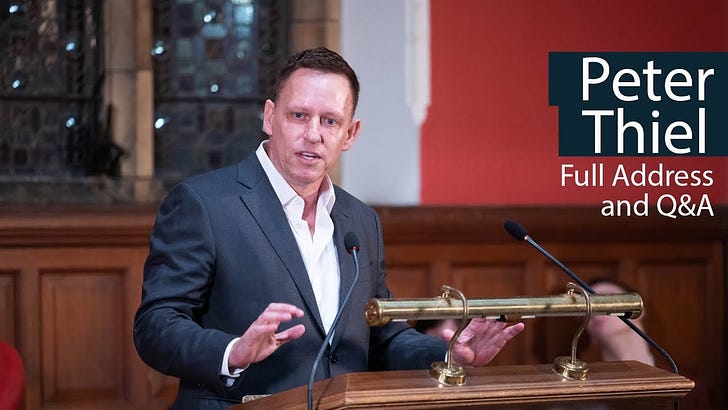Apocalypse
Tags: Word Salad, Peter Thiel, Tech Fascist Cabal, The Apocalypse
Over a month ago, Peter Thiel wrote for the Financial Times about his hopes and dreams for this new Trump administration. Of course, I couldn’t resist reading it, but I wasn’t the only one and some of the reactions were almost as funny as Thiel’s op-ed.
So, it appears as if the US are on the brink of a new era.
Trump’s return to the White House augurs an apokálypsis of the ancien regime’s secrets. The new administration’s revelations need not justify vengeance - reconstruction can go hand in hand with reconciliation. But for reconciliation to take place, there must first be truth.
He’s clearly very happy about the possibility of learning a bunch of juicy state secrets, and I’m sure it must be upsetting for someone who became famous for taking down Gawker to realize he loves gossip as much as any TMZ reader, but the Greek was a little much. According to Thiel, the internet helped make people more aware of the government’s attempts at concealment, citing the scepticism about Jeffrey Epstein’s death as an example. Yeah, I don’t think it’s that much of a stretch to think a sex trafficker with lots of damning information on lots of powerful people who had already been given a suspiciously short sentence by an American court may have been murdered. Though, I remember during the presidential election the Daily Beast mentioning JD Vance’s interest in conspiracy theories and giving as an example him asking whether Epstein might’ve been murdered, so maybe he’s not entirely wrong. Thiel compares the reactions to Epstein’s death with what happened with JFK’s death, which results in an apparent contradiction. Now, what I think he thinks is that it took a lot of time for the theories surrounding JFK’s murder to become mainstream rather than the exclusive domain of basement-dwelling conspiracy theorists when compared to the immediate and aggressive questioning of the official version of Epstein’s cause of death. If there had been internet at the time, all the theories would’ve reached the normies way sooner, because one of the advantages of it is to make all the craziness easily accessible. Of course, if there had been internet at the time, everyone would’ve been able to check Lee Harvey Oswald’s social media profile and find out that he believed JFK was really a lizard person, or something. Anyway, that’s my interpretation, but it’s always possible that Thiel is just an idiot who puts less effort into an essay for a world-renowned news outlet than I do when writing a post for a blog no one will read. By the way, he sounds dangerously close to someone with one of those conspiracy walls when he mentions how Eric Weinstein calls the network of organizations that helped hide information in the olden days as ‘Distributed Idea Suppression Complex’. I googled Weinstein and he definitely seems the kind of person who would say that. More stuff Thiel wants to know? If COVID was really a bioweapon secretly funded by the US government, which Fauci covered up. Okay, he totally has one of those walls, doesn’t he? I was disappointed he didn't mention Area 51, but I guess he doesn't care about aliens.
However, not all countries enjoy the bliss of freedom of online speech, and Thiel warns that the US shouldn’t follow the example of ‘Orwellian dictatorships in East Asia and Eurasia’. He takes the analogy a little too far by referring to the US as ‘Oceania’, and though he mentioned Brazil’s conflict with Twitter and Australia’s laws about age verification on social media, he seems to have forgotten about them; unless Brazil is part of Oceania? Technically, it’s the same continent, but I don’t think Orwell was including it in Oceania. I know the Tech Fascist Cabal is working on South America, so maybe Thiel already thinks of it as a US subordinate. But where does that leave Australia? Of course, geography doesn’t matter much anymore thanks to the internet, and he wonders if the American enemies of free speech may have had anything to do with all the attempts at curtailing it. Sure, because no one does anything without the help of the mighty Americans. Brazil doesn’t need any lessons in authoritarianism, and doesn’t he know how many totalitarian governments and rulers Europe has produced? In fact, his paladin of freedom Trump is cozying up to one of them right now. In addition to free speech, Thiel is very, very worried about lack of privacy. Hmm, is he still traumatized by that baby sugar mess? Because I don’t think it would take the combined power of the FBI and Section 702 of the Foreign Intelligence Surveillance Act to find out about his alleged less than Christian activities when apparently he’s been letting his many, many guests post selfies taken by his pool on IG. He throws in a reference to a ‘social credit system’, which makes me wish that next time Thiel decides to subject himself to the ordeal of public speaking, someone asks him about Russia and China’s alliance.
Thiel was clearly feeling a little dramatic when he wrote this because he compares the coming ‘apokálypsis’ with South Africa’s post-apartheid commission, and I don’t think he’s talking about African-American history. Hilariously, he says:
The first Trump administration shied away from declassifications because it still believed in the rightwing deep state of an Oliver Stone movie. This belief has faded.
So, Trump didn’t reveal any juicy state secrets the first time around because he thought that his side was the one hiding them? But now that he’s transcended the political spectrum and knows that the other side is in on it, too, he’s ready to unleash chaos? That’s all I got, but I’m just a lowly peasant without a conspiracy wall, so… It’s also interesting that someone who wanted to metaphorically flush the Biblical personification of chaos in 2015, now seems to have accepted Trump’s ‘chaotic style’ as a means to an end. Now, if only America were an exceptional country, it could’ve kept lying to itself about its myriad issues. Unfortunately, according to Thiel, ‘it is no longer even a great one’, so it’s forced to face its general crappiness before everyone can forgive each other and focus on what’s really important, like defeating the nefarious narrow cone of progress and silence the ‘racket of crescendoing real estate prices’. Sigh… This doesn’t even merit a ‘What was he on?’; he just sounds like someone who’s half asleep and really should’ve left the writing for the next day.
REACTIONS
I became aware of this new op-ed on Bluesky, and the reactions to it made it sound like a psychedelic delirium of Apocalyptic madness fuelled by Bible quotes and bizarre analogies. I was sorely disappointed. Oh, it is somewhat delirious, but nothing out of the ordinary for Thiel. This wasn’t the first time this happened, though. Over at Twitter, people were going nuts over his reply to a question Piers Morgan asked about Luigi Mangione. After watching the clip, I didn’t detect more than the expected amount of uhs and hums, or sweat. Frankly, it feels like when someone discovers a ‘new’ song that’s been around for decades. Yes, Peter Thiel has some less than conventional views that often make one question his sobriety and is a lousy speaker. He’s been like that for ages. I also wonder how many of the people guffawing at the op-ed had posted about their scepticism regarding Trump’s assassination attempt, or shared that photo of Trump and Obama laughing as proof that They are all in on it together. Would all of them be laughing if instead of a Right-wing billionaire writing about taking down the ancien regime and COVID conspiracy theories, it had been a Left-wing activist writing about taking down the System and wondering if the 7th October attack was a false flag operation? But those are random people on social media; I expected better from professional journalists. I noticed 2: Helen Lewis from The Atlantic and Gil Duran, who’s been chronicling the rise of Tech Fascism on his blog The Nerd Reich.
Lewis used Thiel’s op-ed as a way to introduce The Atlantic readers to all the weirdness that has permeated the already weird MAGA world. She makes some good points, but she also seems to believe that only the Right has any reasons to want to hide information about Jeffrey Epstein when there’s ample evidence that he had connections across the political spectrum. Naturally, Lewis points out the JFK contradiction, but people being fascinated by the theories around his murder and a movie that came out nearly 3 whole decades later having won 2 Oscars isn’t really evidence that everyone immediately started believing in the conspiracies when it happened. And then there's this:
But reading the Financial Times column, I thought: My God, he actually believes this stuff.
Look, I’ve sometimes wondered if Thiel is trolling people myself. However, I’ve only ever felt that about his less outlandish statements. Like, does he realize how awkward it is that he’s saying Trump voters are going to regret voting for him? And yes, I’ve previously joked about Thiel being secretly a dull, conventional thinker and hiring someone to add the weirdest bits to his speeches and essays, but it’s not as if he hasn’t been writing like this for years. Of course, if the weirdest thing written by Thiel that someone is aware of is The Education of a Libertarian, it’s understandable that A Time for Truth and Reconciliation will be a major shock. That still doesn’t make it as troubling as Tucker Carlson believing he was attacked by a demon. Seriously, that shit is not normal and goes well beyond wondering if COVID started as a bioweapon. An even odder comparison is this:
in a recent opinion column in the ultra-establishment Financial Times, Thiel sounds like The X-Files’ Fox Mulder after a long night in the Bigfoot forums.
Has Lewis actually watched The X Files? Because Mulder's crazy-sounding theories were usually right. The only thing that's stopping me from laughing is knowing that she got paid to write this lame article.
As for Gil Duran, he used Thiel’s op-ed as evidence of Tech Fascism’s attempt to use religious talk to create their own cult of technology and new hierarchy with them at the top. His post is longer than both Lewis’s article and Thiel’s op-ed, but it quickly becomes apparent just how well this chronicler of the Tech Fascist Cabal knows his stuff when he writes this:
He has made a conscious effort to swaddle himself in the language of religiosity in recent years, and his essay follows this pattern.
And in the next paragraph, he adds:
He clearly views himself as a brilliant political mind. Yet his florid approach bears the telltale hallmarks of intellectual forgery, and his politicized theology reads like something lashed together by ChatGPT from a paranoid list of cherry-picked citations.
By the way, it’s ironic that he thinks that because for me, it was the opposite, and I felt that Thiel was becoming more conventional and boring. So, what exactly does Duran consider recent years? Against Edenism was published a decade ago in 2015. Does that count as recent? Because this is how he ended it:
We should remain open to the idea that even Faust’s land-reclamation project is part of God’s larger plan. After all, in the Bible, the sea is the place where the demon Leviathan lives, and it symbolizes the chaos that must be rolled back. And chaos will be rolled back all the way: “And I saw a new heaven and a new earth… and the sea was no more” (Rev. 21:1, emphasis added).
In his Reddit AMA in 2014, Thiel had this to say about Jesus and libertarianism:
The theological claim that Christ is the “son of God” is also the anti-political claim that Augustus Caesar (the son of the divine Julius Caesar) is not the “the son of God”. So I think that Christ should be thought of as the first “political atheist”, who did not believe that the existing political order is divinely ordained.
Now, I think that there is a lot of resonance between political atheism and libertarianism, even if they are not strictly identical...
In 2008, Thiel published The Optimistic Thought Experiment, which features 4 Bible quotes, 2 of them from the Book of Revelation, and several mentions of the word ‘apocalypse’. The year before, in 2007, he published The Straussian Moment, though Wikipedia says he wrote it in 2004, which, if true, would make it older than 2 decades. That one ends like this:
And so, in determining the correct mixture of violence and peace, the Christian statesman or stateswoman would be wise, in every close case, to side with peace. There is no formula to answer the critical question of what constitutes a “close case”; that must be decided in every specific instance. It may well be that the cumulative decisions made in all those close instances will determine the destiny of the postmodern world. For that world could differ from the modern world in a way that is much worse or much better - the limitless violence of runaway mimesis or the peace of the kingdom of God.
Regardless of the general craziness of MAGA or the nefarious machinations of the Tech Fascist Cabal, to act as if the contents of the op-ed are somehow new or unexpected coming from Thiel is just embarrassing. Sure, he could be pretending, but if he is, then he’s been doing it for a very long time. Frankly, any professional journalist whose most recent insight on Peter Thiel in the year of 2025 is that he’s weird and inserts religious references in his political talk, really should consider a career change.
By Danforth
More Word Salad
Essay Review: The Education of a Libertarian
Review of Peter Thiel's infamous essay The Education of a Libertarian. With snark.
Review: Peter Thiel's Oxford Union Speech (2023)
Combined review of the Oxford Union speech and the one Thiel gave in 2022 at the Stanford Academic Freedom Conference.






